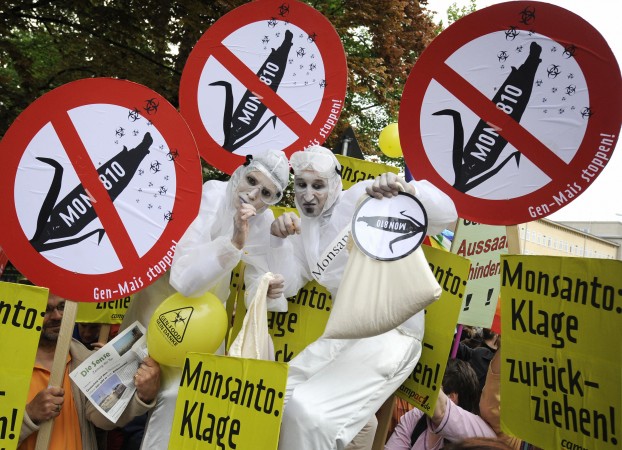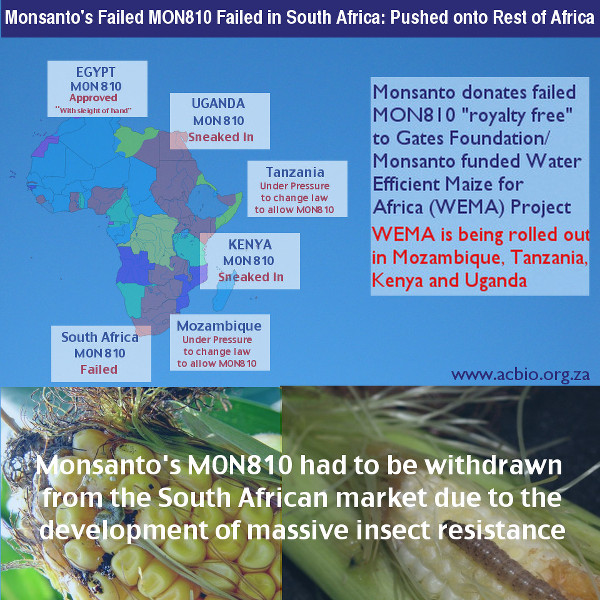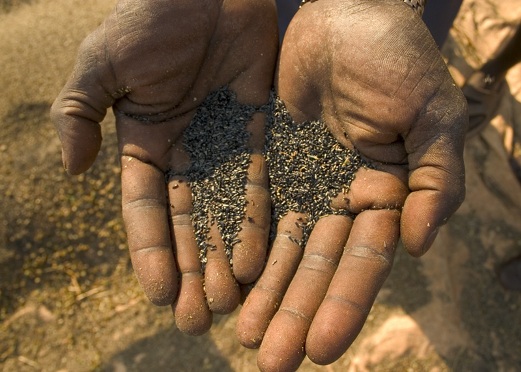
Activists of the online network ‘Campact’ protest outside the administrative court in Braunschweig, Germany, April 28, 2009, against a request by U.S. biotech giant Monsanto.(NIGEL TREBLIN/AFP/Getty Images)
Millions of people worldwide are against food products grown with genetically modified organisms (GMO). In May, two million people voiced their distaste of GMO products during demonstrations in 50 countries, according to a Natural News article in August, which states:
Monsanto, the most hated corporation in the world, has a deceptive message for you
Generally speaking, many of the biggest bio-tech companies in the world would have us believe that GMOs are ‘perfectly safe’ and designed to ‘more efficiently’ feed the world. But, GMOs do not generate greater yields; effectively resist drought conditions; have greater nutritional value or any other consumer benefit.
In fact, a growing body of evidence connects GMOs with health problems, environmental damage and violation of farmers’ and consumers’ rights. The unforeseen consequences of altering the natural growth cycle of our food may be staggering. The following is just a sample of what the experts say:
“The process of genetic engineering always involves the risk of altering the genetics and cellular functioning of a food organism in unanticipated ways. These unanticipated alterations can result in GE foods being allergenic, toxic, or reduced in nutritional value”. - Professor John Fagan, award-winning Geneticist, Maharishi University of Management, Iowa, USA.
Back in 1998, Bob Shapiro (the eventual CEO of Monsanto) even admitted that the effects of GMOs are unknown when he said:
“But we realize that with any new and powerful technology with unknown, and to some degree unknowable – by definition – effects, then there necessarily will be an appropriate level at least, and maybe even more than that, of public debate and public interest.”
Since its inception, Professor Richard Lacey, a microbiologist, medical doctor, and Professor of Food Safety at Leeds University has been strongly against the introduction of genetically engineered foods because of the health risks. Professor Lacey make an important point:
“The fact is, it is virtually impossible to even conceive of a testing procedure to assess the health effects of genetically engineered foods when introduced into the food chain, nor is there any valid nutritional or public interest reason for their introduction.”
Facing demonstrations, especially in Western countries, where many people don’t believe that GMO products are safe for human consumption, Monsanto Co. is searching for new markets.
According to the Natural News, Monsanto sent out “‘Biotech ambassadors’ [who are] engaging in massive Monsanto-backed PR operations to push GMOs into Africa.”
Monsanto does not deny its interest in Africa and states on its website that it provides maize germplasm, which is genetic resources for an organism, to develop maize hybrids in Africa. It also donates to the Water Efficient Maize for Africa (WEMA) project, which provides valuable research for growing drought-tolerant and insect-protected products.
The Kenyan-based African Agricultural Technology Foundation is the leader of the WEMA project, and the Bill and Melinda Gates Foundation, Howard G. Buffett Foundation, and USAID provide funds.
According to Monsanto, “The project is in its sixth year and is approaching a significant milestone as the first WEMA conventional maize hybrid will be available for commercial planting in Kenya by the end of 2013.”
Expenditures and Profits Mushrooming
Nevertheless, “the genetic modification of crops is a lengthy and obscenely expensive business,” states a report from the African Center for Biosafety, released this month.
Research and development plus getting regulatory approval is rather costly, and the companies need to recoup the funds they expended before their move into Africa.
In 2012, Monsanto claimed that it “invests more than $500 million annually to identify and develop new solutions for growers.”
As far back as 2002, the GMO producing companies built into their sales prices the costs to develop, produce, and market their products, according to another report by the African Center for Biosafety, released this month.
Before genetically modified food hit the market, seed expenditures for farmers growing corn increased $0.30 per acre annually. Costs increased to $1.34 per acre annually for the GMO seeds.
“The impact of the Bt [bacillus thuringienis] corn premium on seed industry profits has been remarkable,” the African Center report states.
Earnings for Syngenta AG, a global Swiss chemical company that markets seeds and pesticides and produces GMO products, increased by more than 18 percent between 1998 and 2000. During the same period, Monsanto’s earnings increased by 9 percent, and DuPont Pioneer’s (formerly Pioneer Hi-Bred) increased by 7.3 percent.
Greed and Agricultural Dominance
With profits earned in the developed nations, Monsanto is going into Africa, providing its services for free, according to the African Center report.
However, the cost of going into Africa needs to be recouped within time. At this time, the push toward producing GMO products, mainly maize, is done free of charge to the African farmers. This looks very charitable, especially with the Bill and Melinda Gates Foundation, Howard G. Buffett Foundation, and USAID involved.
It gets problematic in the future, because the farmer has to continue to buy seeds from Monsanto instead of returning to the age-old way of growing maize, which is saving and reusing seeds.
The problem lies in the fact that the chemicals that entered the ground when using the GMO products take years before they are completely gone, while the land lies fallow and can’t be used.
“It is about power, control and greed,” according to a September Natural News article. Quoting the Motley Fool, the article concludes, “A new era of agricultural colonialism will be born where the local farmer ends up becoming enslaved to the global profit demands of corporate agriculture.”
Related articles
- Video: GMOs explained (Natural News)
- Monsanto’s Next Conquest for GMO Dominance (fracturedparadigm.com)
- Monsanto’s Massive Push Into Africa (theepochtimes.com)
Filed under: Africa, Environment, Global Empire, Human Rights, Updates
via @lissnup on WordPress


No comments:
Post a Comment
Note: only a member of this blog may post a comment.